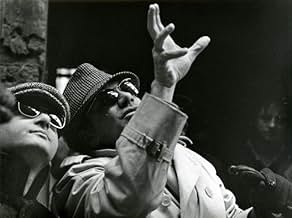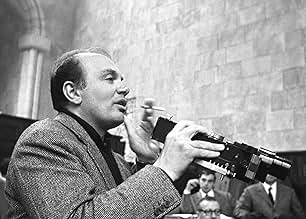VALUTAZIONE IMDb
7,6/10
3556
LA TUA VALUTAZIONE
Prima dell'elezione del consiglio comunale, il crollo di un edificio lascia un imprenditore edile e i suoi sostenitori politici a difendersi da uno scandalo.Prima dell'elezione del consiglio comunale, il crollo di un edificio lascia un imprenditore edile e i suoi sostenitori politici a difendersi da uno scandalo.Prima dell'elezione del consiglio comunale, il crollo di un edificio lascia un imprenditore edile e i suoi sostenitori politici a difendersi da uno scandalo.
- Regia
- Sceneggiatura
- Star
- Premi
- 3 vittorie e 5 candidature totali
Dany París
- Dany - Amante di Maglione
- (as Dany Paris)
Alberto Amato
- Consigliere Comunale
- (non citato nei titoli originali)
Renzo Farinelli
- Giornalista
- (non citato nei titoli originali)
Pasquale Martino
- Capo dell'archivio
- (non citato nei titoli originali)
Mario Perelli
- Capo dell'Ufficio Technico
- (non citato nei titoli originali)
Francesco Rigamonti
- Consigiliere Comunale
- (non citato nei titoli originali)
Renato Terra
- Giornalista
- (non citato nei titoli originali)
Recensioni in evidenza
The first quarter of an hour of this film is completely mesmerising as we see a series of overhead shots of the different sides to the city of Naples and then the incredibly shot building collapse. At the same time we are made aware of the corruption in the building industry and how most of the money ends up in the same place all the time. Rod Steiger plays the main villain of the peace and it is an extraordinary performance. For considerable periods we simply see him prancing about his office, clearly struggling to think of the best way out of the immediate problem, the best way to get more political power and the best way for him and his son to stay on top. he expresses so much, and in such an Italian way, the pressures his constant messing with peoples' lives brings him. There are many fine sequences as the various political factions gang up and then get bought off as the big man inevitably gets his way. I preferred the slightly more fictionalised and later Three Brothers and Illustrious Corpses but this near documentary impression of Italy's boom building phase is very impressive and involving.
This film is not about any aspect of human activity which is particular to Italian life. It is about the prevalence of greed and corruption over the human being and society anywhere. In this sense its value is universal - not limited to Italy. One of its strong points is precisely that it is not focused on an individual family's drama. Such focus often moves in a very superficial way - it turns the universal problem into one family's problem (and if it could be solved everything would be fine). Take a movie like "Ace in the hole". An outstanding movie, one of the best of its kind and its time (maybe of all time) and a good example of the human-focused view. You empathise with the victim, you rebel against the man (KD) but otherwise this can still be the best of all possible worlds. Not so in any of the films of Rosi. Rosi, in this more than in any other of his films, puts the collective problem, as well as the collective responsibility so clearly and so strongly to the fore that I believe this to be, maybe, the best political film of its kind ever made.
Good inquiry movie, talking about the "roaring" '60 when every builder wanted to get richer and richer, basing his success on poor people's needs. It's a constant in Rosi's movies this political touch, but it's not about complaining about one party or the other, but it's more subtly focused on a certain italian laissez-faire in political matters and in social affairs that in some way is still alive today.
Its way of leaving a great space to dialogues and to silent scenes around the city contributes to create a journalistic approach and the witty speeches give the movie an interesting touch.
Well assembled, quite involving, an interesting piece about how power tends to contribute to its power only.
Also an essential view on the 60s and italian postwar society.
Its way of leaving a great space to dialogues and to silent scenes around the city contributes to create a journalistic approach and the witty speeches give the movie an interesting touch.
Well assembled, quite involving, an interesting piece about how power tends to contribute to its power only.
Also an essential view on the 60s and italian postwar society.
In the early sixties Vittorio de Sica and Dino Risi were to show the darker side of Italy's economic miracle known as 'Il Boom' but there can be no fiercer denunciation of the corruption and speculation of the time than this early film of Francesco Rosi.
Shot in Naples by Gianni di Venanzo in a semi-documentary style with a cast comprising mainly non-professionals and a suitably dissonant score by Piero Piccioni, it is an immensely powerful and indeed courageous film.
For the role of Nottola, a thoroughly obnoxious and unscrupulous property developer, city councillor and all round wheeler-dealer, Rosi has acquired the services of Rod Steiger. This fine actor has at times a tendency to 'overcook it' but is far more effective in his quieter moments than when emoting and the director here has kept him on a tight rein. He is adequately 'dubbed' by Aldo Giuffré. It is however Salvo Randone's performance as a glib and oily politician who has evidently studied his Machiavelli that lingers longest.
The collapse of the building and the subsequent evictions in the working class area are brilliantly handled as are the angry exchanges in the courtroom and council chamber. The editing by Mario Serandrei is, as always, exemplary and one is hardly surprised that his expertise was used by Pontecorvo on 'Battle of Algiers'.
Although considered by some to be a minor work in the Rosi canon this film deservedly won a Golden Lion at Venice and has achieved the distinction of being one of Italy's '100 films to be saved'. Rosi himself makes it abundantly clear that although the characters and facts in this narration are imaginary, 'the social and environmental reality that produces them is authentic'.
Shot in Naples by Gianni di Venanzo in a semi-documentary style with a cast comprising mainly non-professionals and a suitably dissonant score by Piero Piccioni, it is an immensely powerful and indeed courageous film.
For the role of Nottola, a thoroughly obnoxious and unscrupulous property developer, city councillor and all round wheeler-dealer, Rosi has acquired the services of Rod Steiger. This fine actor has at times a tendency to 'overcook it' but is far more effective in his quieter moments than when emoting and the director here has kept him on a tight rein. He is adequately 'dubbed' by Aldo Giuffré. It is however Salvo Randone's performance as a glib and oily politician who has evidently studied his Machiavelli that lingers longest.
The collapse of the building and the subsequent evictions in the working class area are brilliantly handled as are the angry exchanges in the courtroom and council chamber. The editing by Mario Serandrei is, as always, exemplary and one is hardly surprised that his expertise was used by Pontecorvo on 'Battle of Algiers'.
Although considered by some to be a minor work in the Rosi canon this film deservedly won a Golden Lion at Venice and has achieved the distinction of being one of Italy's '100 films to be saved'. Rosi himself makes it abundantly clear that although the characters and facts in this narration are imaginary, 'the social and environmental reality that produces them is authentic'.
10rowmorg
I don't recollect giving many 10s. This film has to get the gong: it has it all, great acting, great scenario, brilliant direction, it's one of those films that feels like a slice of life rather than a drama. It could have been made yesterday, although not in the USA, I hasten to add, which is a shame because it really describes the post-WW2 dispensation imposed on Italy by the USA, with the aid of the Comorra, the criminal tribal system of greater Naples. The quintessential American figure, the property developer, played by US icon Rod Steiger, stands at the centre of this maelstrom of a movie, denounced daily on all fronts by the leader of the Left forces, De Vita (Carlo Fermariello), and catered to by the assortment of running dogs and capos on the Right. This movie performs nothing less than open-heart surgery on a great city at a turning point in its history: the eloquence, the in-fighting, the soul-searching. It also contains some great film-making, particularly the initial fatal building collapse that triggers the narrative. This film gets to the heart of what went wrong with the modern city, and it has attained the status of universality. In my opinion, every American high-school student should be obliged to view it in order to graduate from High school.
Lo sapevi?
- QuizRosi considered realizing a documentary, but fearing the Italian censorship, since many political protagonists he wanted to denounce were still in charge at the time, he chose a fictional story instead. He however added a note by the end of the movie: "The characters and facts narrated here are fictional, but the social and environmental reality that produces them is real".
- Curiosità sui creditiWestern Electric is misspelled ('Elettric').
- ConnessioniEdited into Colpiti al cuore (2019)
I più visti
Accedi per valutare e creare un elenco di titoli salvati per ottenere consigli personalizzati
- How long is Hands Over the City?Powered by Alexa
Dettagli
Botteghino
- Lordo in tutto il mondo
- 328 USD
- Tempo di esecuzione1 ora 41 minuti
- Colore
- Proporzioni
- 1.85 : 1
Contribuisci a questa pagina
Suggerisci una modifica o aggiungi i contenuti mancanti























